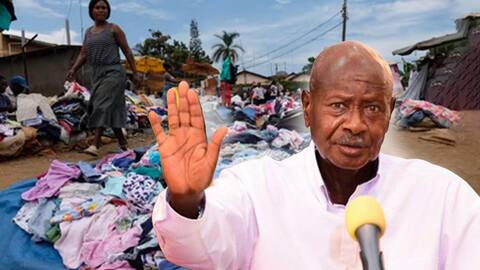Uganda says 'no more' to used clothing of dead people
What's the story
Uganda's President Yoweri Museveni has recently taken a bold step by prohibiting the importation of used clothing into the country. Citing concerns about stifling local textile industries and revealing a surprising perspective, Museveni asserts that these clothes belonged to deceased Westerners. This move diverges from the traditional practice of importing low-cost second-hand apparel, signaling a commitment to fostering Uganda's own textile sector.
Struggle
Local manufacturers' struggle
Local manufacturers in Uganda have long lamented the inundation of second-hand clothing in the market, arguing that it hinders the country's progress up the value chain in the cotton and textile industry. Museveni's ban responds to these challenges faced by local producers who find it difficult to compete with the influx of used garments, despite their potential to produce new and locally-made clothes.
Origin
Origins of donated clothing
A significant portion of used clothing donated to charity in Europe and the USA ends up in Africa, with an intriguing claim that these garments are specifically from deceased individuals. While Oxfam notes that at least 70% of charity reaches Africa, the exact percentage of deceased donors remains unverified. Museveni's assertion calls for a shift in the dynamics of the global second-hand trade.
Impact
Economic impact and regional agreements
Uganda, a major cotton producer, faces economic challenges, as its raw cotton gets exported in semi-processed form. In 2016, the East African Community agreed to a total ban on used clothing imports by 2019. However, only Rwanda enforced it, resulting in the suspension of duty-free export privileges to the United States under the African Growth and Opportunity Act (AGOA) in 2018.
Solution
Expanding the ban and promoting local industries
President Museveni's ban extends further to electricity meters and electric cables. He advocates for the purchase of these items from domestic factories, emphasizing the broader goal of reducing dependency on imports and stimulating local production. This move aligns with Museveni's vision for a more self-reliant and economically empowered Uganda, encouraging domestic industries to thrive. The government is considering implementing the ban in January 2024.
Local concern
What it means for the local population
The Uganda Dealers in Used Clothings and Shoes Association approximates that one out of every three Ugandans opts for secondhand clothing. "Everyone is into secondhand clothes. Only a few people in Uganda can afford new clothes," Allan Zavuga, retail manager of Think Twice, told AFP. According to reports, shop owners at Owino's secondhand clothing market have expressed economic fears over the proposed ban.
